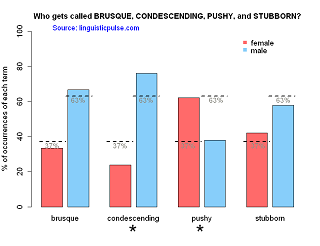You may not realise it, but some of the words used to describe employees in situations like performance reviews can be heavily gender-loaded.
Wondering whether the move against calling women bossy and pushy is really that meaningful?
That’s what a Ph.D student at Georgia State University wondered, too. So the linguist, Nicholas Subtirelu, took a random sample of the Corpus of Contemporary American English to analyze exactly who was being described as pushy, brusque, condescending and stubborn, and just how often.
According to Subtirelu’s previous research, about 37% of individuals mentioned in the Corpus are women, and the other 63% are men – so a perfectly ungendered distribution of a term would be referring to women 37% of the time, and to men 63% of the time.

So while the terms stubborn and brusque don’t seem to be heavily gendered, condescending and pushy, on the other hand, are clearly gendered.
In his analysis, Subtirelu wrote that, “Women are not necessarily more likely to exercise authority but are more likely to be socially sanctioned for doing so due to the perception that they are acting in a manner that is socially unacceptable for women. Men it would seem have a great deal more latitude to exert authority without drawing such criticism.
“It seems then that while "condescending" is not a positive description, it seems to describe an abuse of power as opposed to an illegitimate claim to power as "bossy" and "pushy" are more likely to do,” he explained.
Key HR Takeaway
Be aware of the way women are described in performance reviews - sometimes, the way they are perceived may not correlate with their actual performance. Perceptions may be affected by the concepts that their supervisors have of gender roles and how well the women fit in with those expectations.
That’s what a Ph.D student at Georgia State University wondered, too. So the linguist, Nicholas Subtirelu, took a random sample of the Corpus of Contemporary American English to analyze exactly who was being described as pushy, brusque, condescending and stubborn, and just how often.
According to Subtirelu’s previous research, about 37% of individuals mentioned in the Corpus are women, and the other 63% are men – so a perfectly ungendered distribution of a term would be referring to women 37% of the time, and to men 63% of the time.

So while the terms stubborn and brusque don’t seem to be heavily gendered, condescending and pushy, on the other hand, are clearly gendered.
In his analysis, Subtirelu wrote that, “Women are not necessarily more likely to exercise authority but are more likely to be socially sanctioned for doing so due to the perception that they are acting in a manner that is socially unacceptable for women. Men it would seem have a great deal more latitude to exert authority without drawing such criticism.
“It seems then that while "condescending" is not a positive description, it seems to describe an abuse of power as opposed to an illegitimate claim to power as "bossy" and "pushy" are more likely to do,” he explained.
Key HR Takeaway
Be aware of the way women are described in performance reviews - sometimes, the way they are perceived may not correlate with their actual performance. Perceptions may be affected by the concepts that their supervisors have of gender roles and how well the women fit in with those expectations.





